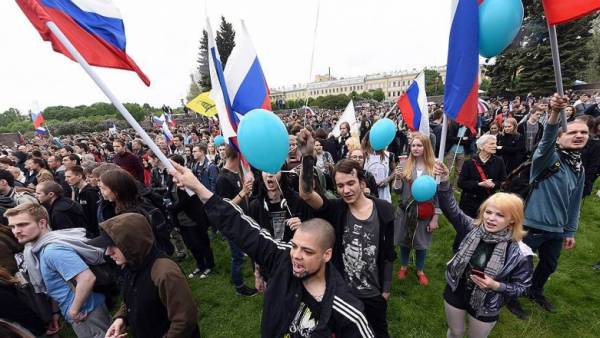The Supreme court stood up for an unsanctioned rally
The Supreme court (SC) ruled in the case of an unauthorized rally on 12 June 2017, recognizing that the participants of such shares cannot be held responsible for this violation under article 19.3. Of the administrative code of disobeying the police. In case of refusal to leave the rally, they should be punished under article 20.2 of the violation of the legislation on public events. The decision could have broad implications for activists, as the rejection of the application to them of article 19.3 is automatically prohibits to hold more than three hours those who have not been brought for violations of the rules of holding rallies. According to experts, this means that several hundred arrests of peaceful demonstrators over the last fifteen years was illegal.

Pensioner Irina Jurgilewicz 13 June 2017 was fined Frunzensky district court of St.-Petersburg for participation in an unsanctioned rally on 12 June at the Champ de Mars under two articles of the administrative code article 20.2 (violation of the legislation on meetings) and article 19.3 (disobedience to the demand of a police officer), respectively, and 10 thousand 500 rubles., after the police after the detention of more than a day. The St. Petersburg city court decisions agreed, but the Chairman of the court composition of the administrative chamber of the Supreme court Vladimir Merkulov upheld only one of them (article 20.2). The second (article 19.3) entirely abolished, indicating that separately involve Mrs Jurgilewicz for disobeying the police was illegal.
In the judgement of the Supreme court States that the Complainant failed to comply with legal requirements of a police officer on termination of participation in a public event, but the draw for this it is necessary for the “special rate” of the administrative code of the meetings under article 20.2, and an administrative offense under article 19.3 of such actions do not constitute.
In addition, the administrative code prohibits the infliction of punishment twice for the same offense, said judge Merkulov.
The decision States that such legal position expressed in paragraph 33 of the resolution of Plenum VS of 26 June 2018 № 28 “On some questions arising at courts by consideration of administrative cases and cases on administrative offenses related to the application of the legislation on public events”.
We will remind, the decree of the armed forces said the rules for the prosecution of the protesters, and the judge Merkulov, who prepared this resolution as a speaker, three days later (decision dated 29 June) have applied it in practice.
Irina Jurgilewicz to comment on the judgement of the Supreme court refused her representative lawyer Valery Voloshin called “polycaprolactam” that the armed forces, dismissing her complaint, satisfied the other. Sun, he said, ignored the refusal of the St. Petersburg city court to question the defence witness MS Jurgilewicz without seeing any infringement. “Look, what do you say to the court in Strasbourg,” said Mr Voloshin.
The precedent is the fact of discovery of the case, Jurgilewicz and its revision — sun, according to its database, such decisions on complaints brought to responsibility for participation in meetings under article 19.3 are not carried.
But the most important thing — an exception to the judicial practice of application of article 19.3 in favor of article 20.2 shall prevent the mass detention for more than three hours of those who were not involved previously for violating the law on rallies.
“The decision in the case Jurgilewicz means that several hundred arrests of peaceful demonstrators over the last fifteen years was illegal. It is noteworthy that the courts of General jurisdiction have not heard us, although this argument may sound, perhaps, in every process,” — said “Kommersant” the lawyer of the Moscow Helsinki group, Alexander Peredruk. In addition, in his opinion, it should mean that in the future participants of public events can’t arrest if they participated in uncoordinated action, as part 5 of article 20.2 of the administrative code does not provide for administrative detention as a form of punishment.
As explained “Kommersant” lawyer Sergey Golubok, article 19.3 provides the administrative arrest, unlike article 20.2, for which the arrest is only possible in cases of repeated violations, and infliction of harm to health or property, the obstruction of functioning of objects of life-support or infrastructure. The legislation provides for administrative detention for a period exceeding three hours only “detention” articles, the lawyer said. Therefore, “the participants of public events, for the first time brought to administrative responsibility cannot lawfully be detained in police custody for a period exceeding three hours,” he said.
According to Mr. Peredruk, courts in St. Petersburg are still arresting citizens for disobedience to the police during public events, as the Russian government in the European court of human rights insist that the attraction twice for one and the same act did not constitute violations of the Convention for the protection of human rights.
Anna Pushkarskaya, St. Petersburg